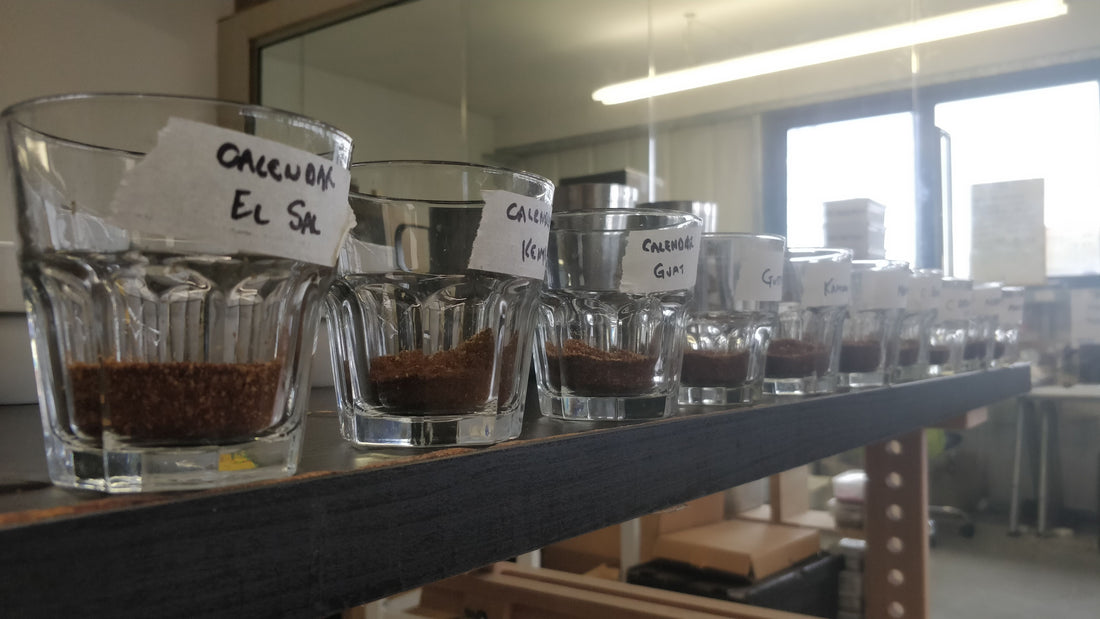About the author: Alex is a Q-grader with 10 years of coffee industry experience, and co-founder and coffee buyer/roaster for Scenery
What does it mean to taste?
I think we need to first discuss “how do we taste?” - and this isn’t just another article gushing about “retronasal palates, olfactory receptors and the whistle slurp” talking about the mystical art of cupping.

Photo: Kenyacof cupping lab - here coffee tasters can get through up to 10,000 samples per harvest
This is about personal perception, and talking about how I learned to taste coffee in the hopes it could be useful.
My first time thinking about tasting, and aroma - I have really strong memories of learning to cook, and just intensely smelling jars from the spice cabinet before adding them to my food - tasting, tweaking, smelling, adjusting. Engaging with the aroma and taste and trying to make things taste better.
But not really consciously thinking too hard about the actual process. It wasn’t until I learned to Taste (and I mean with a capital T), that I realised there is tasting in the way you enjoy, on a surface level, and tasting in the way that you engage. In the way that going for a really nice meal at a restaurant (the type that comes as A Tasting Menu) might make you sit up and pay attention. Chefs tend to have very good coffee palates, perhaps for this reason.
It’s like shifting into a different gear, mentally, going from just idly consuming, tasting for pleasure, to Tasting: being aware, mindfully, conscious of what’s in your mouth. Being aware of what you are presently tasting, feeling on your tongue, being reminded of what it makes you feel, trying to put words to it. Putting other people’s words for what they taste when they try the same thing. You don't ever have to do this, I should be clear - it's purely a choice. Chefs, coffee people, anyone in the hospitality and food and beverage business are passionate and chose to taste like this (and get paid for it) for the very simple reason that we enjoy it, and so that others can enjoy the fruits of our labours.
I have very strong memories of when I first became aware of the “second gear” when it came to tasting - in one of my first “proper” coffee jobs, part of the barista duties was making batch brew filter. We had to brew it, taste it, and use a little device that measured how strong it was (telling us how good of a job we were doing at being consistent/how much coffee we were getting into each brew from the grounds). There was a little notepad that each batch diligently had notes recorded - how it tasted, and if a tweak to the recipe was required.

Image: The exact flavour wheel that was on the wall, which helped with flavour perception- reproduced for educational purposes, credit to counterculturecoffee.
There was a little tasting wheel on the wall, and the bags of coffee were available with the tasting notes on the front - but the standards were high. I realised very quickly that my idle tasting - the average thought process - wasn’t cutting it. Tasting professionally meant becoming far more critical, looking for flaws as much as positive notes. I had to start to engage with it, actually Tasting.
Through what I was experiencing, the notes in the book and the discussions with other baristas trying the coffee, and the flavour notes on the bag - there was a little triangulation, and I found my ability to name and remember flavours rapidly growing - all aided by a tasting wheel. The more I did it, the easier it got - and if I got stuck, someone else might say something about what they perceived that suddenly made it click. Learning not just what do I perceive, but what do other people perceive that aligns with this? And that’s coffee tasting in a nutshell - how do we come to a consensus on perceived experiences?
And that’s been formalised - there’s now reference standards for certain flavours backed by sensory research.
It could be extremely taxing at times to engage with - especially with lots of coffees at once. And sometimes frustrating too - when the promised flavours are just not present. Sometimes tasting notes are just.. not right? There’s a whole article to follow on how roasteries pick tasting notes that should help explain why.
So, without working at an extremely critical and high end coffee bar, how can we learn to Taste better? I think the broadest principles still apply - take a moment to engage, to fully switch on your senses. If you can define if something tastes good or bad to you - in any case - that is the foundation of every other experience. Flavour is taste memory, after all, so what we’re doing is linking our here and now experience with our past, and all that takes is practice. Everything you personally experience is valid, but the best way to speak a common language is to taste and talk with others. Taste comparatively, keep notes, try to stay consistent with your recipes and change one thing at a time. If you work in the industry, try and implement a more controlled quality system, if your team and manager are up for it.
Regardless of your role – be it a casual drinker or a coffee professional – take a moment with each cup, engage with it, and see what happens when you do.

